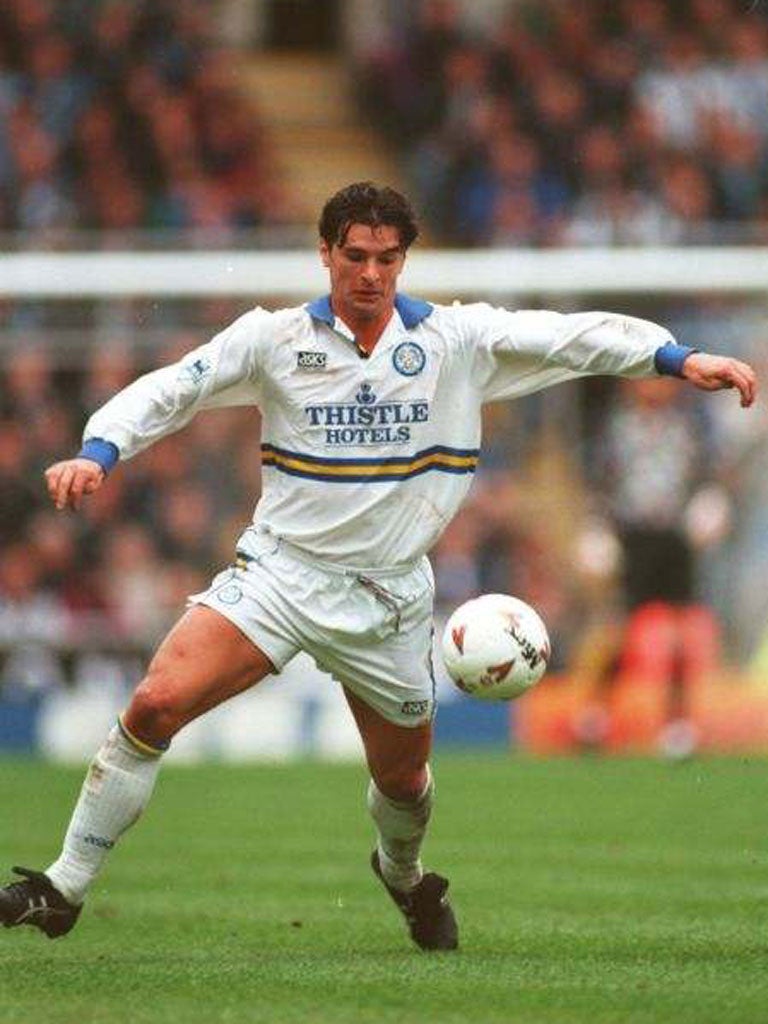Speed: a team man who gave his all
Midfielder's adaptability and resilience allowed him to play 17 seasons in English game's top flight

Gary Speed was one of those unflashy, unspectacular players whose value is most apparent when they are not playing. In Speed's case, such absences were also noticeable because they were so unusual.
Rarely injured, infrequently suspended and so consistent he was hardly ever dropped, Speed's name was one of the first on the teamsheet throughout his long professional career. His first match came when he was a teenager, his last in his 40th year, and most were in the Premier League. For 17 successive seasons, with Leeds United, Everton, Newcastle United and Bolton Wanderers, he never made less than 24 top-flight league appearances and played three-quarters of the programme on all but two occasions. In 2006-07, at the age of 37, he played a full league season for Wanderers, still looking to go box-to-box, though now using his experience to compensate for advancing years.
Fifteen seasons earlier, Speed had missed just one match in a season when Leeds became the last champions of the old Football League. Then, playing in a left-sided role, he provided the legs in a midfield quartet that also featured Gordon Strachan, Gary McAllister and David Batty. This was, surprisingly, to prove the only senior honour of his career, although he later collected runners-up medals in the FA Cup (Newcastle in 1998, 1999) and Football League Cup (Leeds in 1996 and Bolton in 2004).
When recalling what Speed was good at, his athleticism inevitably comes to mind, but there was a lot more to him than the ability to run and run. From an attacking perspective, he had a fine left foot, was excellent in the air – especially so given he was 5ft 10in – and timed his runs into the box to telling effect. A steady source of goals throughout his career, he scored in 20 successive league seasons and averaged a goal every six games. Defensively, he was disciplined and knew how to tackle. He was, in short, a very good example of the modern midfielder.
While lacking the exceptional gifts that would have won him a place at one of the elite clubs, his all-round ability, lack of weaknesses and belief in the team ethic meant he was always in demand.
Born in north Wales, Speed attended the same Flintshire school as Michael Owen. Signed by Leeds as a trainee, he was given a debut by Howard Wilkinson, under whom he won a Second Division championship medal. The First Division title followed but Leeds failed to build on that success and he moved to Everton, his boyhood team, for £3.5m in 1996. He scored some important goals as Everton narrowly avoided relegation, and was made club captain, but left under a cloud when he unexpectedly signed for Kenny Dalglish's Newcastle in early 1998, for £5.5m. Into his 30s he would play a significant role as Newcastle achieved a trio of top-five finishes under Sir Bobby Robson, before moving to Bolton for £750,000.
Changing from a team managed by Bobby Robson to one led by Sam Allardyce meant another switch in playing style for the midfielder but he adapted again, with Bolton maintaining a top-eight place.
In January 2008, he finally dropped out of the top flight, joining Sheffield United for £250,000. He played regularly for 11 months until suffering a back injury which eventually prompted retirement.
By then, he had moved into management, initially as a coach at Bramall Lane, building on a brief period in that role at Bolton. After Kevin Blackwell was fired early in the 2010-11 season, Speed was asked to take over. He was not immediately successful and when the Welsh FA targeted Speed, who won 85 Welsh caps as a player, taking his career total to 925 senior matches, it was a move that suited all parties.
International management seemed to suit Speed, for he oversaw a significant improvement in Welsh fortunes. Having been 112th in the Fifa rankings when he took over, Wales rose to 45th last month, the highest ranking since 1995. An improving team, benefiting from young talent, exemplified by the likes of Gareth Bale and Aaron Ramsey, were playing with freedom and confidence under Speed and, until yesterday's dreadful news, had been looking forward with enthusiasm to the 2014 World Cup qualifiers.
Gary Speed: life and times
Born 8 September, 1969, Mancot, Flintshire
Club career
1988-96 Leeds United:
248 games, 39 goals
1996-98 Everton:
58 games, 15 goals
1998-2004 Newcastle United: 213 games, 29 goals
2004-08 Bolton Wanderers: 121 games, 14 goals
2008-10 Sheffield United: 37 games, 6 goals
International career
85 caps for Wales, 7 goals
Honours
(All with Leeds United)
1990: Second Division title
1992: First Division title and FA Charity Shield
1988 Signed professional contract with Leeds, making his debut against Oldham aged 19 December 2006 Became the first player to make 500 Premier League appearances when he featured in Bolton Wanderers' 4-0 victory over West Ham
August 2007 His goal against Reading made him the only player to have scored in every Premier League season, an achievement later matched and extended by Ryan Giggs
August 2010 Named Sheffield United manager after retiring as a player three months earlier
February 2011 Managed Wales for the first time, beating the Republic of Ireland 3-0 in the Carling Nations Cup. Recorded third win in a row and fifth in seven matches in his last game in charge in November, a 4-1 friendly victory over Norway
Join our commenting forum
Join thought-provoking conversations, follow other Independent readers and see their replies
Comments
Bookmark popover
Removed from bookmarks